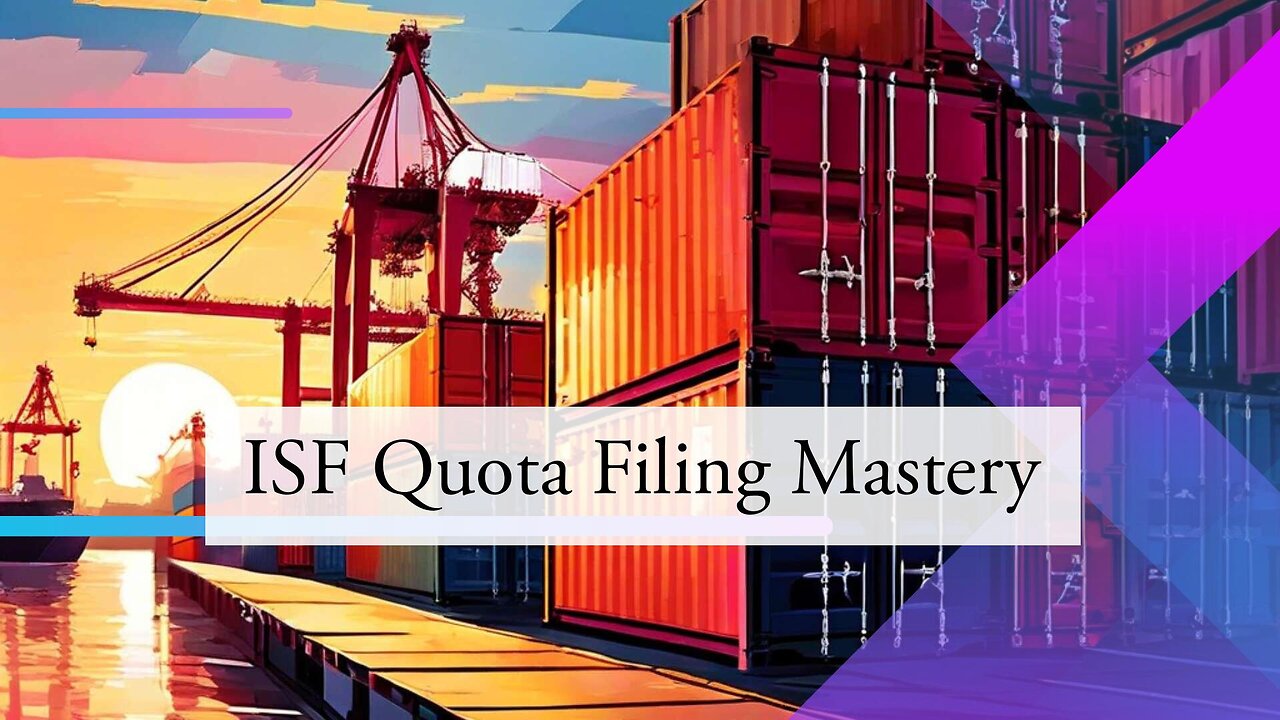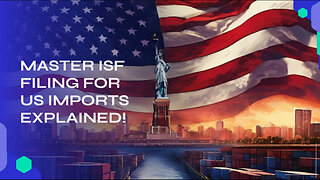Premium Only Content

Navigating the Restricted Path: ISF Filing for Quota-Regulated Goods
ISF Depot // 661-246-8217 // [email protected] // www.isfdepot.com
The Importer Security Filing (ISF) process for quota-regulated goods is a crucial aspect of customs brokerage. Quota-regulated goods are products subject to import quotas, which limit the quantity that can be imported in a given period. Understanding the rules and regulations surrounding these products is essential for importers to ensure compliance and smooth customs clearance.
The ISF, also known as the 10+2 filing, requires importers to submit certain information to the US Customs and Border Protection (CBP) when importing goods by ocean freight. This information consists of 10 data elements provided by the importer and 2 data elements provided by carriers.
For quota-regulated goods, the ISF process takes a slightly different path. Importers must consider whether the quota is absolute or tariff-rate. An absolute quota sets a limit on the quantity of goods that may be imported, while a tariff-rate quota imposes a limit on the quantity of goods that can be imported at a reduced tariff rate.
When filing the ISF for quota-regulated goods, importers must adhere to certain considerations. The filing must be made within the prescribed timeframe, typically 24 hours before departure if the shipment is traveling to a US port directly. However, if the import quantity falls within the quota limit, the filing can be made as early as possible.
Accurate and complete provision of all required information related to the quota-regulated goods is crucial in the ISF filing. This includes details such as the HTS code, quantity, country of origin, port of export, and other relevant information. Any errors or omissions can lead to delays, penalties, or seizure of the goods.
Importers must also monitor the quota usage to ensure that their imports do not exceed the limitations set. Staying updated on any changes to the quota status and adjusting import plans accordingly is vital.
In conclusion, an understanding of the specific rules and regulations governing quota-regulated goods is essential for importers during the ISF filing process. Accurate and timely filing, along with monitoring quota usage, is crucial to maintain compliance and avoid potential issues during customs clearance. Stay tuned for more videos where we delve further into the intricacies of customs brokerage and international trade.
#usimportbond
#isfcustomsbroker
#uscustomsclearing
#isfentry
Video Disclaimer Here: This tutorial is independent and not affiliated with any US governmental entities.
00:33Importer Security Filing (ISF) process for quota-regulated goods is crucial for compliance and smooth customs clearance.
00:55 Quota-regulated goods are products subject to import quotas, either absolute or tariff-rate, to protect domestic industries or for trade-related reasons.
01:56 ISF filing for quota-regulated goods requires accurate and timely submission of information including HTS code, quantity, country of origin, and monitoring quota limits.
02:38 Understanding specific rules and regulations is essential to avoid delays, penalties, or seizure of goods during customs clearance.
-
 3:50
3:50
ISF Depot
6 days agoUnraveling the Secrets of ISF Filing: A Comprehensive Guide for Importers
102 -
 LIVE
LIVE
vivafrei
3 hours agoHe Was There! Charlie Kirk Assassination Analysis & Conspiracy Debunking w/ Andrew Piskadlo!
8,149 watching -
 1:04:57
1:04:57
The Quartering
2 hours agoTrump Tricks Democrats Again, Cheerleader Monster, Abortion Clinics Shutdown & More
23.4K7 -
 LIVE
LIVE
Russell Brand
2 hours agoPfizer Agrees $70 Million Deal With Trump As Study Links Covid Vax to CANCER!! - SF644
3,712 watching -
 LIVE
LIVE
Dr Disrespect
4 hours ago🔴LIVE - DR DISRESPECT - BLACK OPS 7 MULTIPLAYER GAMEPLAY - NEW!
1,647 watching -
 LIVE
LIVE
Dr. Drew
3 hours agoFL First Lady Casey DeSantis: Florida Ending ALL Vaccine Mandates, Including For Schools w/ FL Surgeon General Dr. Joseph Ladapo & Tom Renz – Ask Dr. Drew
949 watching -
 1:23:46
1:23:46
Sean Unpaved
2 hours agoOctober Blitz: Wild Card Game 3s, CFB Coaching Chaos, & TNF Fireworks
11.3K1 -
 1:01:36
1:01:36
Dear America
2 hours agoEpisode 2 Graham Allen Show
37.6K40 -
 1:59:01
1:59:01
The Charlie Kirk Show
3 hours agoCancel Netflix? + The Secret Service Disaster + Turning Point Everywhere | Tatum, Cocca, Gaffrey
90.8K37 -
 LIVE
LIVE
ahdedazs
1 hour ago $0.37 earnedBlack Ops 7 EARLY ACCESS BETA! First Stream on RUMBLE!
123 watching